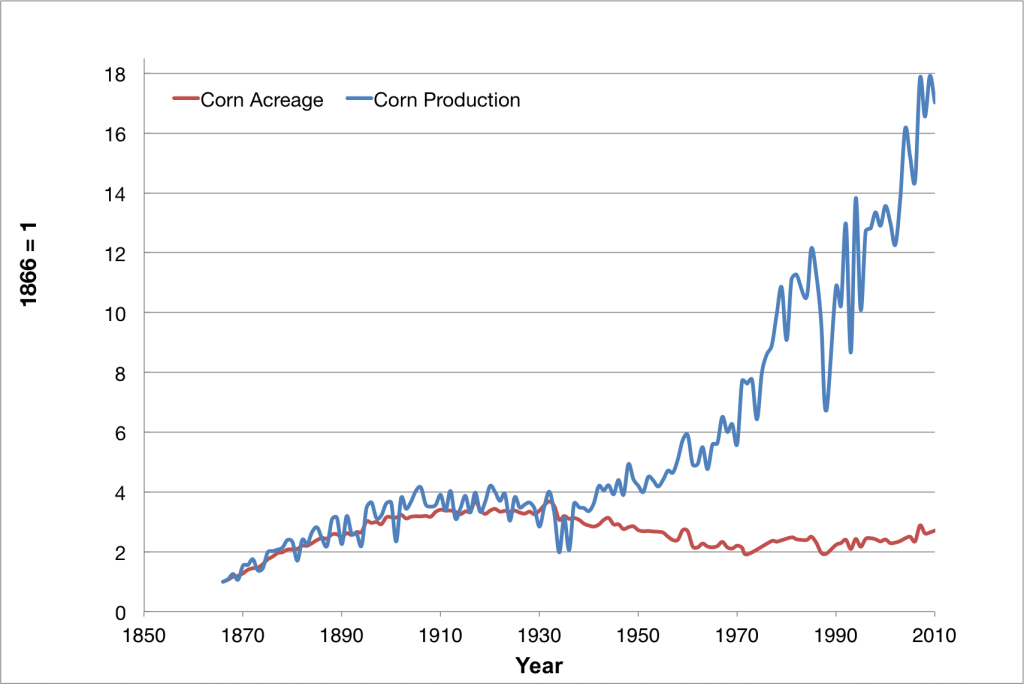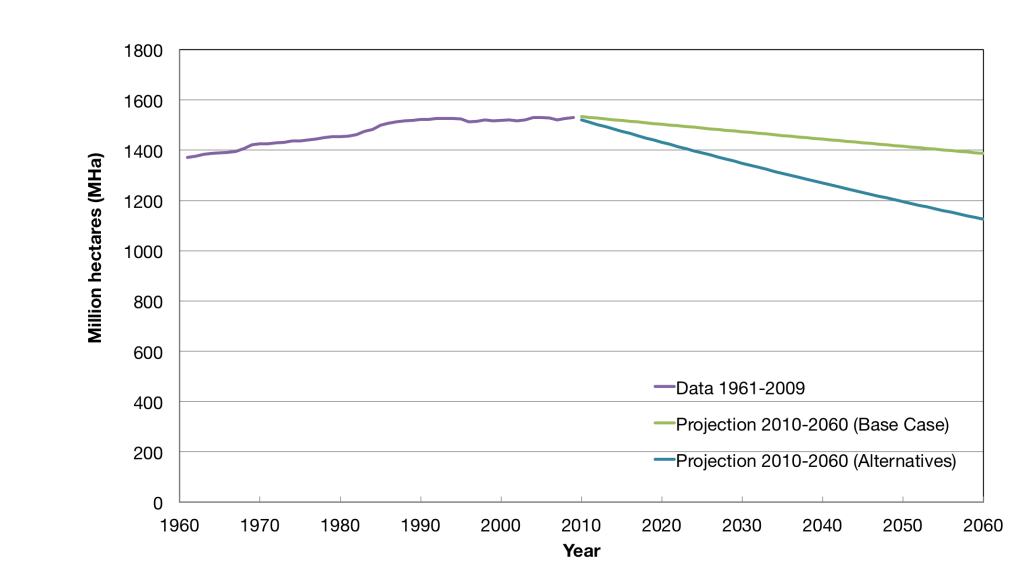Agriculture has always been the greatest destroyer of nature, stripping and despoiling it, and reducing acreage left. Then, in about 1940, acreage and yield decoupled in the United States. Since then American farmers have quintupled corn while using the same or even less land.
…Corn matters because its production towers over other crops, totaling more tons than wheat, soy, rice, and potatoes together.
…Crucially, rising yields have not required more tons of fertilizer or other inputs. The inputs to agriculture have plateaued and then fallen — not just cropland but nitrogen, phosphates, potash, and even water.
…If we keep lifting average yields toward the demonstrated levels of David Hula and Randy Dowdy, stop feeding corn to cars, restrain our diets lightly, and reduce waste, then an area the size of India or of the United States east of the Mississippi could be released globally from agriculture over the next 50 years or so.
Just a sample from Jesse Ausubel’s fascinating full article. Prepare for more bears and other wildlife, he says. Hat tip to Suresh Naidu.
I don’t know if all the details are correct, but this more or less fits my view that fears of a food crisis of any kind (in the developing or developed world) are overplayed. And also why on balance I’m a fan on GMO crops.
Dissenting views welcome in the comments, as I’m an amateur at best.



11 Responses
It’s amusing that nobody is mentioning that the aforementioned corn goes mainly (as in, >90%) to animal feed.
If you want to solve any food problems you think exist, it’s as trivial as eating one less burger a month and noshing a few lentils instead.
But sure, let’s pretend that current ag has a linear relationship to nutrition.
The US population is projected to grow to about 400 million from the current 340 million by 2050. That is 60 million more mouths to feed. Reduction in acreage without substantial increase in yield will not feed these extra people.
The world population is projected to increase to 9 billion from the current 7 billion and most of this increase will take place in the developing world.
Similarly, to the USA, these people will need food and if they can introduce methods which gave the USA such an abundance of yield then there will be no problem feeding them, particularly in Africa. The economic growth potential for Africa in the development of modern agriculture is considerable.
Studies might differ (http://www.enveurope.com/content/24/1/24), but one thing that is certain is that pesticide resistance is a dangerous weapon. Just like the overuse of antibiotics in the livestock industry. They are effectively pressuring these lifeforms into evolving immunity to our weapons against them. Vit A rice is a “nice” project, but ultimately ill conceived. After >10 years they are not close to producing a competitive product: people wouldnt grow it because of lower yields than other varieties and less resilience to local conditions. Besides vit A deficiency is clearly not a technological problem. It’s economic, poverty. Poor people eating vit A rice would still have to afford the fat needed to absorb the vitamin. Because of course, this rice would not be destined to the US would it? Eating a varied diet with the right balance of nutrients is not a problem asking for a tech fix really.
Some places might not be water stress, but the global picture is one of increasing water scarcity. Google water stress in India for instance. Good part of the US too. Proper pricing is fundamental and urgent. If there is not incentive for efficiency water will keep on being wasted.
Soil should really be a major area of focus. It has the potential to store carbon (http://grist.org/food/the-secret-to-richer-carbon-capturing-soil-treat-your-microbes-well/), enhance yields and increase resilience to droughts. On depletion: http://www.scientificamerican.com/article/only-60-years-of-farming-left-if-soil-degradation-continues/
Martin’s point on GMOs is wrong. Farmers don’t spray more because of GMOs (research shows farmers spray less with GMOs). I suspect farmers in the US spray more than in Europe because of the regulatory environment. Vit A fortified rice is a technology developed to solve a very real problem as well, namely Vit A deficiency. I’m not sure what that sentence is trying to say.
We are also not running out of water anytime soon except in particular locales (southwestern US. other places affected by climate change). This is a classic externality: water should be priced according to its worth, which it’s currently not. California already does reserve a chunk of the water for wildlife and nature resilience as well.
As to soil depletion, some links to research would be interesting. All I know about it is that it’s been a concern since at least the ’70s.
Well put Martin, about soils, water and GMOs. In general this article claims a reduction of impact but its graphs nearly all show only a flattening of the curve not a decline. In many areas such as vehicle miles traveled per person we have reached a peak, but that peak is very unsustainable and I see now signs (yet) of a real decline.
Chris, I agree that to some extent the concerns about total food are overblown, we have a capacity to produce way more edible food within our current system. But the idea that some of this land will return to nature is extremely unlikely at best. We have declining agricultural acreage because in some areas it is being taken over by cities (see Phoenix over the last century), other areas the soil has been destroyed, and finally in the west we are probably going to be pulling acreage out of production due to water.
Water is a great example of how unless forced by policy and people, our society will not leave a drop for nature. Right now in California many want to take away the little that is left in rivers to protect fish. Water use per capita has fallen across nearly all western cities but there is no more water in our rivers for “nature” than since we took it away in the first place.
The thing is agriculture does not have an impact simply based on the acreage used. American farmers might produce more food on the same acreage as in the 1940s, but the way they farm has a greater impact on the environment.
Modern farming is basically an extractive industry. It works with monocultures and is input intensive. While precision agriculture is helping decrease the intensity of the inputs, the very essence of modern agriculture and its decoupling with the environment makes its upcoming crisis inevitable. The answer as to why comes from its treatment of the world’s most important resources: water and soil. Agriculture is responsible for something like 70% of water consumption. Modern agriculture and economics say that it is logical to deplete California’s groundwater t grow almonds. When the water is out, it will be out. So one of the world’s biggest producing regions might well be reduced to nothing in the next decades.
Soil is the deal breaker though. Once the soil is spoiled, it’s game over. Hydroponics might be a bandaid: you can grow veg, but not 100 ha of wheat. Experts concur that, at current rate, we have about 60 years of soil left (obviously with huge regional disparities). And it is not a matter of less inputs, but rather a systematic problem with the way modern agriculture deals with nature and the ecosystem services it depends on. So unless there is a radical shift in that, that “rewilded” land will most likely have to come under cultivation once the existing cropland has been irreversibly damaged.
On GMOs, not against them per se, but really tough to be a fan of any of the specific advances brought by these technologies. Basically >90% of GMO products are pesticide resistant. Which means that they facilitate the emergence of “super” pests (US farmers now spray way more pesticides than European ones because of this pest resistance), which in turn leads to increased application of pesticides. So really, they are great at making money, but not great on the environment (check the monarch butterflies). Stuff like vit A fortified rice are just like it, a technology looking for a market.
The whole article seems very techno optimistic. Because tech has reduced its own impact it assumes more tech is the answer. When in agriculture, really, it ultimately boils down to what you grow your food on. Ignore it, like modern ag does, and no amount of technology will be able to overturn this fate of many civilisations that destroyed the environment around them
I like your articles. Relates with us in Africa.
I listened to Jesse Ausubel on the SALT (Seminars About Longterm Thinking) podcast and also thought he was super-interestesting:
http://longnow.org/seminars/02015/jan/13/nature-rebounding-land-and-ocean-sparing-through-concentrating-human-activities/
I’d love to hear from his critics though.
Doug
http://teachbetter.co/
RT @cblatts: Will modern agriculture will turn more of America back to nature? http://t.co/UdbGIs42Ga
RT @cblatts: Will modern agriculture will turn more of America back to nature? http://t.co/UdbGIs42Ga
RT @cblatts: Will modern agriculture will turn more of America back to nature? http://t.co/UdbGIs42Ga